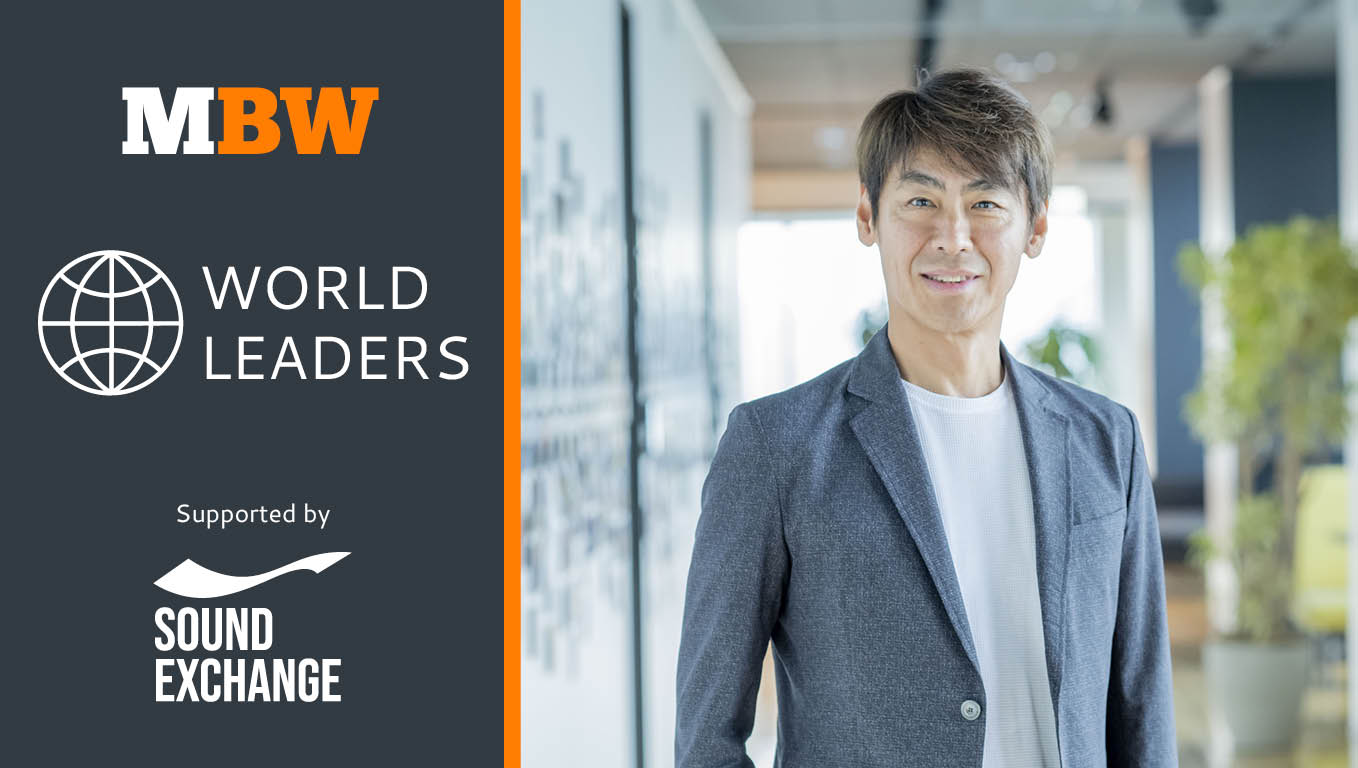MBW’s World Leaders is a regular series in which we turn the spotlight toward some of the most influential industry figures overseeing key international markets. In this feature, we speak to Naoshi Fujikura, President & CEO of Universal Music Japan. World Leaders is supported by SoundExchange.
Running one of Japan’s largest music companies in the world’s second-largest music market is a high-wire act. You need to balance tradition, innovation, expert precision, and creativity to stay at the top of your game.
That’s exactly what Naoshi Fujikura has been doing for the past 11 years as CEO of Universal Music Japan.
He’s not losing any sleep over the role’s various challenges, though, and laughs when we ask him about what keeps him up at night.
“I never have problems sleeping! I receive a lot of encouragement from Sir Lucian Grainge. We’ve come far, but there are always things I am thinking about, how we can continue to support our artists with new innovations and expand the reach of Japanese music globally.”
During his tenure, the company has thrived, tripling its sales and doubling its market share in the process, and all while navigating a market still dominated by physical product in an increasingly digital world.
“Looking back at these past 11 years, the most important thing is that we’ve kept making hits continuously,” Fujikura tells MBW.
“While the numbers say a lot, the most important part of our success has come from people – both our teams and our artists. We have focused on creating a company that through working together, has been able to help lead and accelerate change in Japanese music culture and fan consumption.”
“Fundamentally, our job as a music company is to help people listen to our music.”
He adds: “Fundamentally, our job as a music company is to help people listen to our music. Our artists create beautiful, wonderful music, and how we innovate and create new ways to deliver it to fans is our job.
“We have done it, we are doing it, and we will continue to do it in Japan, but we also have expanded our horizons and our ambitions. That is why we want to make global stars from Japan, so people outside can also discover our artists, and enjoy their music as well.”
Japan’s music industry is fascinatingly contrasted. While streaming has transformed most major markets, physical CDs still account for around 60% of Japan’s recorded music revenue.
The market has also historically been dominated by domestic repertoire, with international acts struggling to gain traction locally.
Yet, as Fujikura explains in our wide-ranging interview below, Universal Music Japan is at the forefront of changing these dynamics, developing (domestic) megastars like Mrs. GREEN APPLE, Fujii Kaze, King & Prince, and Ado, while creating unique superfan experiences through initiatives like its Harajuku physical store.

Universal Music Japan also made a big statement of intent with its recent acquisition of a stake in A-Sketch, a company that functions as both record label and artist management – part of UMG Japan’s strategy to “maximize artist value” across multiple touchpoints.
Here, Fujikura shares his insights on Universal Music Japan’s success, the challenges facing the Japanese music market, and his strategy for developing the next generation of global superstars.
He also reveals what keeps him motivated after more than a decade at the helm: “Making continuous hits is exciting for us,” he says.
“The proportion of catalog sales is becoming much bigger globally, which is great, and catalog is always important. But as a creative music company, we must continue to find, sign, and develop new artists and make new hits…”
You’ve led Universal Music Japan for 11 years now. Zooming out, what would you consider your most significant achievement during your tenure?
Looking back at these past 11 years, the most important thing is that we’ve kept making hits continuously, and for 11 years, we’ve kept growing. While the numbers say a lot, the most important part of our success has come from people – both our teams and our artists.
We have focused on creating a company that through working together, has been able to help lead and accelerate change in Japanese music culture and fan consumption. We have very strong teams, and the people working here are very committed to our vision for the market. We have such great artists, and that is the reason why we have continued to grow so strongly these past 11 years.
Universal Music Japan has seen tremendous success with artists like Mrs. GREEN APPLE, Ado, and King & Prince. What do you look for when signing and developing new artists in the Japanese market?
When we sign artists, the important point is whether the A&R can believe in that artist, not just in terms of having a hit, but a big hit, and beyond that is their potential to build a loyal fanbase and have continued success.

For me, my signing process was based on three personal standards. One is whether the A&R can imagine the artist performing at Tokyo Dome, one of the biggest venues in Japan.
Second is whether the artist can achieve a million-selling product. Third is whether the A&R can see the artist appearing on Kohaku, which happens every New Year’s Eve and is the biggest music show on TV in Japan. Appearing there is a mark of becoming a first-class artist in Japan.
These benchmarks are based on my own experience, and our A&R team continuously updates and adapts these benchmarks to reflect the current music landscape.
Before we sign an artist, we always ask our A&R team if they believe the artist will reach these milestones? By doing so, our A&R people have developed their skills as signees, and this also helps the label map out our vision to help these artists achieve those goals. Since we are a major music company, our task is to make great hits and develop artists who can represent the nation, not just the small ones.
Your strategy seems to center on the concept of superfans. How would you define Japanese superfans, and how does their behaviour differ from that of dedicated fans in other markets?
If I could talk about superfans or fandom from a cultural aspect, Japan is quite unique because we have a historical tradition of supporting artistry, for example, Kabuki actors. Kabuki has been there for hundreds of years, and people support those actors. These people are not consumers, but supporters – they feel have ownership in terms of developing the artists.
“Japan is quite unique because we have a historical tradition of supporting artistry.”
So historically, we have such a culture within society. These fans are very loyal and committed. Maybe that’s something unique to Japan. Once someone becomes a fan of an artist, they remain a fan for years and years, not just for a trend. This is a powerful tool in creating lasting musical legacies for artists here.
So now globally, we are increasingly hearing the words “fandom” or “superfans,” but maybe the strength of the market here in Japan is the loyal and the deeply committed attitude of the fans, the ways that they invest in artists’ careers and take pride in their continued success.
Universal Music opened a physical retail store in Harajuku, which seemed like a bold move into retail. What was the thinking behind creating a dedicated physical space for fan experiences in Japan?
As a music company, our task is to maximize the opportunities for the artists, not just selling music CDs or merchandise, but innovating with products and experiences to strengthen the fan relationship and loyalty we discussed earlier. Our headquarters in Japan is located in Harajuku, one of Tokyo’s most vibrant areas and our shop was launched within walking distance from there.
The Universal Music Shop in Harajuku, is an interaction space for artists and fans, and also a space for fans to connect with other fans. It’s a focal point for people to mingle and interact with each other. Of course, you can get exclusive products there, but you can also feel the vibes, which is great as a fan.

Some people just come to visit, just to look around, and sometimes they don’t buy anything, but they go to our D2C stores – our e-commerce or online shops – and purchase goods after they go home. This kind of development is something you can enjoy by having this physical space, and it’s great for us to see how fans and artists can have a physical place to interact with each other, and of course with the physical products.
This has also become one of the reasons many Japanese artists want to work with Universal Music and want to be signed by us, because we have this vehicle and are always thinking about deeper connections and ways to have success here.
How do you measure success with initiatives like the Harajuku store? Is it purely commercial, or are there other metrics that you consider?
This is great for us and for our artists because fans become visible to us, especially in the age of the digital business. Through the store and our D2C and e-commerce online stores, we also have our own data and contact points with fans, so we are able understand and service fandoms holistically, in a way that others cannot.
Through our physical and online shops, we can directly contact our consumers and fans and deliver them physical products. We can respond to fan demand and desires and create products that mirror them. So, for us and for the artists, fans, and consumers, we have become a visible part of the experience, which is a very important KPI for us. This is also an important value for the future, as it shows UMJ is helping elevate our artists, shift culture and help spark new trends.
“Yes, we have very strong domestic music roster, and K-pop is selling well in this market, but we also want to find ways to make our international artists and music popular again as a global company.”
Harajuku is one of the most popular places in Japan, particularly for young people. We want to make this a hot spot for trends, make music a catalyst for trends in Harajuku. This is not only about selling physical products or having a physical space for people to come; it was about opening a cultural center in many ways.
The first global artist we featured in this shop was The Rolling Stones with their RS9 products. In recent years, it has become more of an issue trying to sell international music in Japan. Thirty years ago, international music was very popular in the Japanese market but listening trends have shifted here.
Yes, we have very strong domestic music roster, and K-pop is selling well in this market, but we also want to find ways to make our international artists and music popular again as a global company.
How do you balance maintaining focus on the traditional physical market while also growing in digital? And how do you plan on balancing these two sides over the next few years?
Thank you for the question. It’s a very fine balance, and the balance continues to shift. Looking at the physical and digital proportions in Japan 10-11 years ago, 80% of the product was physical and 20% was digital. Now it is 60% versus 40%, so the balance is changing.
Also, as I mentioned before, the ratio between domestic music and international music has changed. Ten years ago, it was roughly 80% domestic and 20% international repertoire, but now it’s 90% domestic and 10% international.
As a company, we have worked very hard over the past decade to be ahead of these shifts, and our continued growth during this period is testament to that. That said, over the last decade, we have seen several global artists who we have helped achieve great success in Japan, despite the trend towards domestic repertoire.
“As a company, we have worked very hard over the past decade to be ahead of these shifts, and our continued growth during this period is testament to that.”
For us, the most important thing is to have people listen to music as much as possible. In Japan, like other markets, young people are leading the music trends and consumption.
Young people listen to a lot of music through streaming or digital platforms, so that area keeps growing. But at the same time, young people might predominantly listen to music digitally, but because of the deep cultural relationship with fandom, they also buy CDs – not to listen to the music, but because they want to possess something their favorite artists made.
So, our challenge, our job, is how we can continue to deliver products that are desirable for fans, whether that is by including merchandise with physical products, or providing opportunities for them to meet with artists they love, because those fans are superfans, very loyal fans, that are willing to pay extra for those special editions and experiences.
It seems like anime music is a big global export for Japan. You’ve partnered with Frontier Works via Virgin Music Group, for example. Do you see anime music as a potential bridge for Japanese artists to break globally?
Yes, that could be one way to help create global artists from Japan. Anime used to be called a subculture, but now it’s becoming mainstream. So, anime movies or manga are becoming mainstream, which is a great opportunity for us.
As you mentioned, this could be one way to bridge Japanese artists onto the global stage. However, once you position an artist as an “anime artist,” it becomes very difficult to develop their career beyond that. So, we have to go two or three steps further, because we want to make absolute stars, not just anime hit artists.
Our artist Ado has become popular with the global anime audience due to her appearance in the One Piece film franchise but has also been building an audience of her own for many years outside of anime, which has enabled her to tour in the US and other countries. She is currently on her second world tour, which will see her perform for over 500,000 fans around the world.
So, while anime is one of the cultural bridges available for us, there are also other ways to do it like social media, sync, collaborations and other opportunities to crossover.
Our long-term goal has always been to create global stars, to build on domestic success and find new fans beyond. An example of this, our singer-songwriter Fujii Kaze, who actually had a breakthrough hit a couple of years ago is now set to release an album on Republic Records this September.
He is producing an album with a world-class sound and is aiming for success in the global mainstream without starting with an anime tie-up. Republic Records is interested in him purely for his musicality and artistry, not simply his Japanese background. In the future, I hope to see many more cases like this.

We are serious about wanting to make our own global superstar artists from Japan like other global artists that have built great Japanese fanbases here in recent years, despite the shift towards domestic repertoire.
You’ve developed partnerships with management companies like HYBE Japan. What makes those partnerships successful, and what can you learn or apply to your strategy from a company like HYBE in terms of breaking global superstars?
Even before UMG [signed] a global deal with HYBE, we had already built a good relationship with them, beginning when they were called Big Hit Entertainment. We learned a lot from them, and at the beginning of the relationship, they relied on us. They wanted to make BTS big in Japan, and they needed domestic expertise on how to sell and how to break artists in Japan, and that’s we could provide. At the beginning, we learned from each other, as we built a huge Japanese audience for BTS together.
For example, TV might already be considered old media in the United States, but in Japan it works and is still very important to breaking artists here. HYBE particularly wanted to sell physical products in Japan, so there are specific things you need to do to sell physical products, and we’re the specialists in that.
“Even before UMG [signed] a global deal with HYBE, we had already built a good relationship with them. We learned from each other, as we built a huge Japanese audience for BTS together.”
However, and especially in the context of COVID-19, they were great in moving onto Instagram and other social media, digital marketing, and the development of digital and fan platforms. When COVID-19 hit, they [BTS/HYBE] were suddenly much stronger because they already had platforms to connect with their fans. When everyone could no longer move around, they were able to utilise the foundation they had built through digital marketing that connected the band with their fans, probably much quicker than anyone else.
At that time, some Japanese artists didn’t even have digital delivery of their music, so some were a bit behind. The movement was much faster for K-pop artists, and communicating and marketing directly with fans was much easier.
We also saw this generational shift to digital as a key growth opportunity, invested in our teams to expand their expertise and embraced these channels and platforms as a way to better connect artists with fans.
Universal acquired a stake in A-Sketch recently. What specific strengths did A-Sketch bring into Universal’s portfolio in Japan, and what was it about the company that interested you most? Can we expect to see more acquisitions like that in the near future?
First of all, the most important thing is people – what kind of people are there? For A-Sketch, it was very attractive because of their leadership, their track record in A&R, and of course, the artists.
A-Sketch is not just a record company; they also operate as a successful management company. Having both functions was very important because, as I mentioned before, our job is to maximize artist value. We’re not just selling the music, but expanding the commercial opportunities around each artist is our focus.

So, having both functions was very attractive for us, and they have very capable people, including the artists. This is why we were attracted to this particular company.
To answer your question about whether we’ll have more acquisitions. This depends on many things. Like with A-Sketch, or Office Augusta before it, this is about people. If we find a company that aligns with our philosophy and has high-quality people and artists, yes, of course, we’d love to do that. But we’re not acquiring companies just for the sake of increasing numbers or making a bigger business. It’s all about quality, and the value and opportunities that it would bring to UMJ.
What do you consider the biggest challenge facing the Japanese music industry today?
One issue is the decline in population, especially the aging society issue. This is not only an issue for us – Korea has the same issue, as do some other developed countries.
Music is a culture led by young people, so that is why we are focused on our superfan strategy, exporting our artists to other global markets, and continuing to support our deep roster of artists and fans of all ages, with the product and experiences they desire.
“Music is a culture led by young people, so that is why we are focused on our superfan strategy.”
This is another reason why over the past decade, we have been focused on better connecting artists with fans, creating commercial avenues to meet the desires of superfans, and unique new experiences to grow those fandoms, so we always think about how we can maximize the value of music. Our job as a music company is to maximize artist value and protect the value of music as well.
How do you view the role of AI and emerging technologies in the Japanese music industry and for Universal Music Japan?
This is a very important issue for us to consider in terms of where we position ourselves, For UMG, we have to protect artists – that’s our duty, and we share the global position of the company in how we approach AI, and other new technologies., but we can also use advances in technology to benefit our artists.
“There should be rules to protect artists’ creativity and talent, because that is precious.”
Of course, regulations and laws differ for each country, and Japanese laws on AI or new technologies are, I don’t know if it’s the right word, but they are “easier” on technology, or maybe “user-friendly” in general. So, we really have to keep our eyes on it.
We cannot stop or avoid these developments, and we must embrace the opportunities. AI if used to help human creativity is a good thing, we just have to make sure it is done respectfully and ethically and does not infringe on artists’ rights or hinder their creativity.
There’s a very fine balance, and there should be rules to protect artists’ creativity and talent, because that is precious.
Looking ahead to the next decade, what most excites you about the future of Japan’s music business and Universal Music Japan’s role in it?
Things are changing. New technology always emerges, AI is here, and we are leading the industry in trying to find, and tools are changing, but at the center of what we do is always the artist. How we can find and develop new talents is the core of what we do, and the next 10 years will be very exciting.
It might seem like a boring answer, but this is what we do, and this is what excites us – it’s the reason to wake up in the morning. As human beings, we always look for new artists and exciting songs, and our job is to answer those desires as a music company. I strongly believe in that.

From our success with Mrs. GREEN APPLE, we learned so much. Some years ago, Taylor Swift dominated the top 10 chart by herself, and now the same thing happened with Mrs. GREEN APPLE here in Japan. When we saw that, we learned so much – first, how important signing great talent is as a starting point, and more importantly, how to develop the artists to build lasting catalog and artist legacies.
We can’t just think about selling music; maximizing the value and brand of the artist is very important. Working with our artists to maximize their potential, has brought us success. Mrs. GREEN APPLE’s record-breaking success in recent years has been an incredible learning experience for our team.
If there was one thing you could change about the music business in Japan or globally, what would it be and why?
I have several things I’d like to change!…
The dream would be for the language barriers to disappear. As Japanese non-English speakers, most of our artists sing in Japanese, so that has historically been a big struggle for us internationally. If we could overcome the language barrier, that would be wonderful for us, especially if everyone in the world could start understanding Japanese!
“The dream would be for the language barriers to disappear.”
This is actually an area that AI could be very helpful for bridging the language challenge. One example of this is the HYBE artist Midnatt, who used AI to release multiple different language versions of the same track trained ethically on his own voice, and it can also give fans the ability to better understand and translate the original songs in real-time.

SoundExchange was independently formed in 2003 to build a fairer, simpler, and more efficient music industry through technology, data, and advocacy. The only organization designated by the U.S. government to administer the Section 114 sound recording license, SoundExchange collects and distributes digital performance royalties on behalf of 700,000 music creators and growing.Music Business Worldwide








